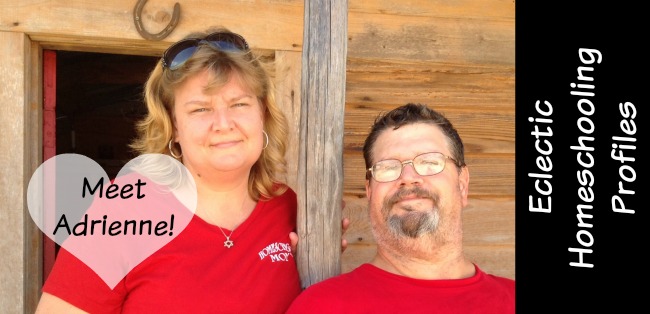 Eclectic homeschooling involves meshing different educational philosophies and methods into something that works for your family. As a result this will look different from family to family. We are featuring a series of interviews with eclectic homeschoolers to show how varied eclectic homeschooling can be.
Eclectic homeschooling involves meshing different educational philosophies and methods into something that works for your family. As a result this will look different from family to family. We are featuring a series of interviews with eclectic homeschoolers to show how varied eclectic homeschooling can be.
Meet Adrienne!
Why did you decide to homeschool?
Deciding to homeschool came after trying to advocate for one of our sons within the public school system. Kindergarten through second grade we attempted to work with teachers, specialists, and IEP documents, but never seemed to make head way academically or socially for our son. Our eldest children arrived via foster/adoption at ages 5 and 8. Our son had learning disabilities and psychological issues which made the classroom environment frustrating for all involved. We decided to open our homeschool and withdrew him from public school by the beginning of his third grade year. His sister was doing well in elementary school so we decided to leave her enrolled and we had a toddler at home.
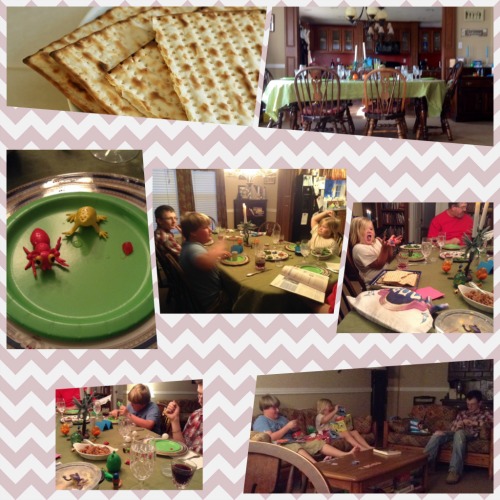
We didn’t have a long term plan for our homeschool rather it was an alternative to public school. Fast forward and our eldest son graduated in 2014 at age 16 and went on to attend a local community college. During the years we did withdraw our daughter from middle school after seeing it was not a good fit anymore. She finished her high school at the local community college as an adult. Our youngest children were never enrolled in public school. By the time they were of preschool age we had decided that we didn’t want to enroll them and we could provide an education at home that would offer a safe and custom learning environment. Our homeschool has evolved to meet the needs of our children.
How long have you been homeschooling?
We opened our homeschool in 2006 and this is our tenth year.
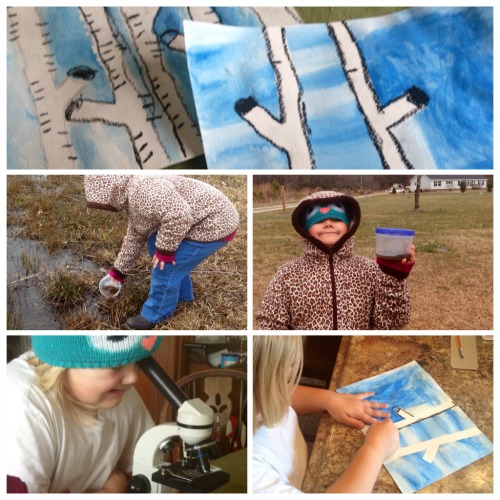
What ages/grades are you homeschooling?
Currently we have our 8 year old daughter and 11 year old son (spring birthdays). Our graduates are 21 and 18. Grades are relative. We choose materials with age ranges except or math. My daughter is working in second grade math, but joins her brother in science and history on a higher grade range. My son is tackling sixth grade math but is working on thirds grade language arts. The only time I focus on grade levels would be ordering the CAT5 standardized testing materials and on high school transcripts.
What were your results on the What Kind of Homeschooler Are You Quiz?
Score for Waldorf Education: 7
Score for Traditional Education: -23
Score for Unit Stuidies: 8
Score for Montessori Education: 7
Score for Thomas Jefferson Education: 9
Score for Unschooling: 19
Score for Classical Education: 8
Score for Charlotte Mason Education: 21
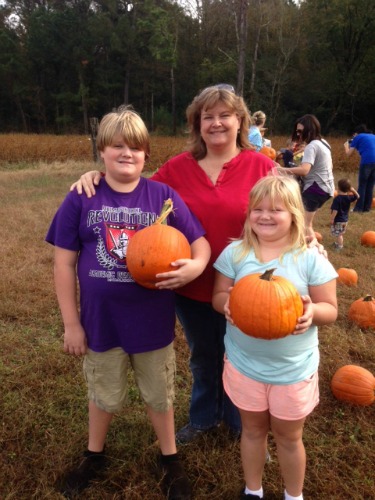
Use 3 words to describe your homeschool:
Jewish, consistent, comfortable
What makes your homeschool eclectic?
We are a Jewish family. In order to provide a custom academic course of study that doesn’t contradict our faith we have to be eclectic. A Jewish box curriculum in any method style of homeschool does not exist. We also had children enrolled with exceptional needs. Curriculum that fit my eldest son’s needs does not fit my youngest son. The idea of investing in a curriculum and handing it down through four children is a myth to me. I have recycled so many resources I can’t keep track. While I may have scored a certain way on the quiz above it isn’t how I have taught all four of my children. We consider their needs and abilities first and find a resource that will work for them.
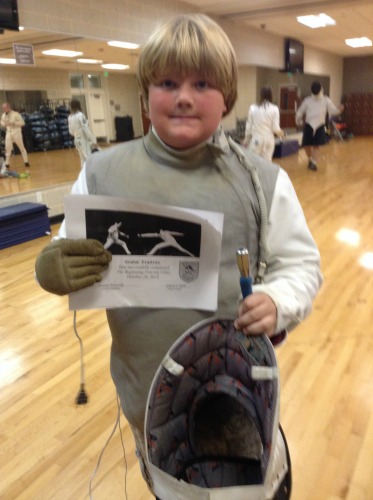
During high school my eldest son was losing stamina for academics. He was a reluctant learner all along. A high school diploma was a priority. I chose materials that he could tolerate and complete. These are not materials I would have ideally wanted for all my children to experience. It is only recently with my younger two children that I am able to offer curriculum that aligns with my idea of how we should learn. If we had to stack our books in categories classical education would be the largest pile followed by lots of hands on opportunities in math, science and art. My youngest children have had the benefit of being in our family from the beginning, so their perceptions of learning are positive. They have developed interests and have the abilities to follow through and complete a challenge.
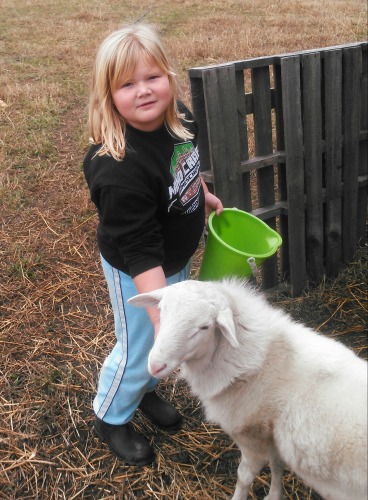
Have you always been an eclectic homeschooler?
Yes.
What do you think makes your homeschool unique?
Our family makes our homeschool unique. As I mentioned we are a Jewish family and we live in a rural area 60 miles from a Temple. We are not surrounded by a Jewish community. We belong to a large homeschool support group that has over 200 members and we are the only Jewish family homeschooling in our homeschool community. We also are a family with children who are adopted and biological. Four children equals four unique needs and gifts that require a custom education.
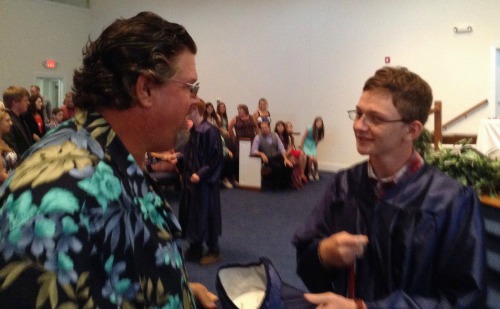
When folks say “our homeschool doesn’t look like anyone else’s”….well we mean that. I have a small core group of homeschool friends. I admire these women greatly and am happy to call them my friends. However, I am also reminded when one finds an awesome resource to share, that our family is unique. Often the resource is overtly Christian, a new devotion or a unit on Christmas. Last December a few Moms took off from their curriculum to do a study on advent. After feeling a bit out of sorts, I rolled up my sleeves and created a Hannukah, Festival of Lights unit for our family. The feeling of being on the outside of the circle is a fleeting one. It takes me back to childhood when you’re the last kid picked for a game or there is an inside joke and you don’t get it. Most days I thrive on being unique and blazing my own trail.
What does a typical day or week look like in your homeschool?
We have a predictable routine as we all thrive on order. My older children especially needed dependable schedule. In the years that I have only been homeschooling my younger kids I have been able to relax more. Having children three years apart I have a tag team approach to lessons. I will work with one child while the other one has an independent activity to do. The children will then swap places for another lesson followed by a lesson we do together. This system works for us in that each child gets that one to one time, and no one is working independently for too long a period of time. I also curb my social media and phone calls to before breakfast and lunch time. These can be time-takers and throw off our whole day if not planned for.
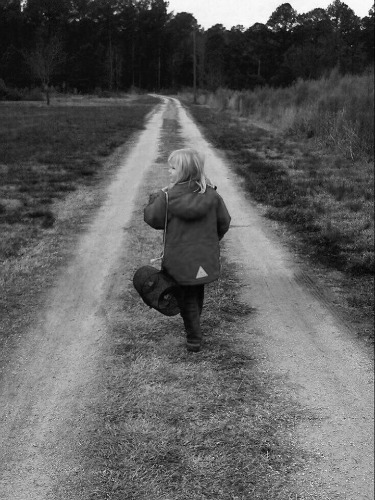
Monday-Wednesday we begin by 8:30 break for lunch at noon for an hour. We typically are finished by 2:00pm no later than 3:00pm. After lessons we tackle chores, and free time. Kids head outdoors by 3:45 to meet up with cousins. Thursday we have a co-op and head out by 9:30am. We cover STEM science, art, PE and lunch while at co-op. We may stop after co-op to run errands in town and return home mid afternoon. Friday we begin by 8:30am and are usually finished by lunch. The afternoon is spent preparing for Shabbat, which involves baking and household chores. The kids help, but mostly have free time.
Four days a week we do Math and Language Arts. Two days we rotate Science and History/geography lessons. Two – three days we have Torah lessons.

When we are not at co-op our group will meet up at a local park on Thursdays. We also participate in a homeschool support group that offers field trips. Our kids have attended fencing classes on Wednesday afternoons and played park and rec basketball. Once a month we head to Pizza Hut for the Bookit program. Each child receives a free personal pizza if they have done their reading for the month.
What curriculum has worked in your homeschool?
Language arts
All About Reading * game changer
All About Spelling
Language Arts for the Well Trained Mind
G.U.M. drops editing/grammar
Supplements: The Bazzilions, music videos . School House Rock video set. YouTube videos; read alouds, shorts on grammar and seasonal themes.
History
Odyssey History – Pandia press
Horrible Histories – book series and youtube videos
All through the Ages, history through literature guide. Christine Miller
Science
Elemental science Paige Hudson
Math
Torah
g-dcast.com
challahcrumbs.com
Living Jewish Values Behrman House
Morah, Morah, Teach me Torah, Torah Aura Productions
Be Like G-d Ron Wolfson
Explorers Bible Behrman House
Art
Home Art Studio
Artforkidshub.com
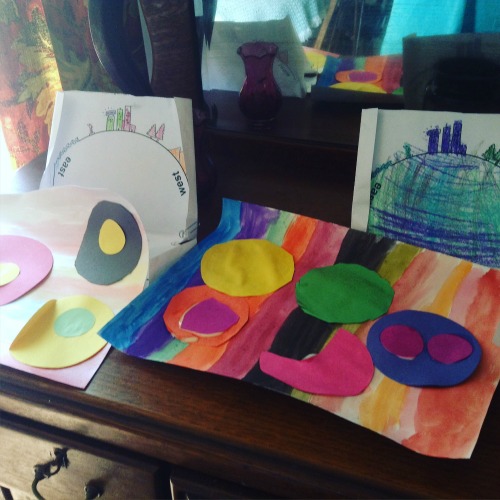
Do you have any favorite homeschooling books?
The Homeschool Handbook Mary Griffith
The Three Rs Ruth Beechick
Home Learning Year by Year Rebbecka Rupp
Do you tweak curriculum to work for you? Describe how you do that.
Yes. My children who had learning disabilities needed custom adapted materials in order to be successful. First I tried to obtain resources that were written in a way that would enhance the learning, and then I modify as needed. My eldest son has a disability in written expression, so I minimized the essays required. I offered to take dictation and he used a computer to compose written work.
Currently I am homeschooling two children who are three years apart. I adapt weekly lessons to allow for their different abilities. In history for example both kids will fill in their maps. My eight year old will need help with labeling the regions while my eleven year old will not. My son will look up the vocabulary and write the definitions in his history notebook. The same vocabulary will be discussed with my eight year old and I will write the definition into her history notebook. Doing this allows us to cover one history and one science program together.
We have chosen a rigorous math program in Saxon math. I was amazed to learn that while my son completes about 120 examples in one week a similar student in Math U See may only complete 25 examples per week! We have never finished all the lessons in a Saxon Math book. I am content with completing 80% of the lessons given the massive amounts we cover compared to other programs.
I have also skipped activities when they didn’t fit in with our week. In history we had an activity to bake bread while studying Monks in the Middle Ages. We bake bread every Friday, so we didn’t need to do this activity. I view the teacher guides as suggestions rather than concrete must dos.

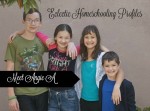





I look up to Adrienne in our co-op. The kids really love the STEM class that she teaches and has really intrigued my little 6 year old to aspire to be an inventor. She is a true inspiration to the kids and the moms!
😊 thank you Kelly for such kind words. I so value our small co-op and all the friendships our family has made.